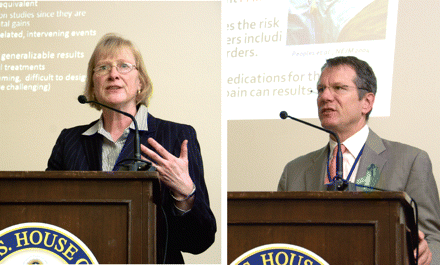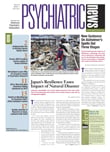Three top researchers reminded congressional staff of the value of psychiatric research at a Capitol Hill briefing in May sponsored by APA on the latest developments in treating autism, posttraumatic stress disorder, and substance abuse.
"Federal investment in biomedical and behavioral research funding is vital if our society wants to develop better diagnostics, better treatment, and interventions for mental health and substance use disorders," said Annelle Primm, M.D., M.P.H., deputy medical director and director of the Office of Minority and National Affairs at APA, in introducing the three speakers.
Susan Swedo, M.D., chief of the Pediatrics and Developmental Neuroscience Branch at the National Institute of Mental Health (NIMH), began by explaining to the staffers the complexity of autism spectrum disorders. The core symptoms of social and communication deficits, along with repetitive behaviors and a high dependence on routine were difficult enough, she said. But there are usually numerous other behavioral, language, motor, cognitive, neurological, and psychiatric problems that accompany the primary diagnosis.
She described a long list of behavioral, medical, and dietary therapies that have been put forth to treat autism, very few of which were backed with any valid evidence of efficacy (Psychiatric News, May 6).
However, there have been significant improvements in recognizing and understanding co-occurring medical and psychiatric conditions, especially gastrointestinal, immune, and sleep disorders, as well as attention-deficit/hyperactivity disorder and anxiety.
Collaboration between her unit at NIMH and the Autism Treatment Network is now permitting faster development of efficacy and effectiveness trials based on pilot studies, she said.
Matthew Friedman, M.D., Ph.D., executive director of the VA's National Center for PTSD, spoke of risk and resilience factors affecting incidence of posttraumatic stress disorder (PTSD). Dissociation, depression, conditionability, and negative appraisals of PTSD symptoms and of one's self all increase risk, he said. Genetics play a role too, since research has shown that individuals with different serotonin transporter genotypes were variably affected depending on the amount of social support they received.
"People with the s/s allele are more vulnerable, but social support can offset this genetic vulnerability," he explained.
Studies by Charles Morgan III, M.D., of Yale and the Connecticut VA, have shown higher levels of norepinephrine, neuropeptide Y (NPY), testosterone, and DHEA in Special Forces troops compared with regular soldiers, said Friedman. Special Forces soldiers can mobilize more NPY under stress and sustain it longer, helping them to function better.
Further research on the interactions of those genetic, biological, and social factors is under way to better understand vulnerability and resilience and ways to use that knowledge to effectively deliver care to veterans, he said.
In addition to other psychiatric problems, many troops returning from war are misusing tobacco, alcohol, and prescription drugs, said Wilson Compton, M.D., M.P.E., director of the Division of Epidemiology, Services, and Prevention Research at the National Institute on Drug Abuse.
Rates of psychiatric symptoms are higher among Reserve and National Guard personnel than regular troops, and those rates rise even more nine to 12 months after they return home, compared with three months postdeployment.
Smoking rates are higher in military personnel (32 percent) than among the general population (25 percent), said Compton. Soldiers are also more likely to start smoking or relapse when they are deployed. "Service members who smoke have lower fitness levels and are at greater risk for injury," he said.
Use of illicit street drugs is a lesser problem with today's troops than it has been in the past, mainly due to the services' no-tolerance policies that can lead to a quick discharge. Rates now are significantly lower than among comparable civilian age cohorts.
"The entire increase in illicit drug use is explained by the misuse of prescription drugs," said Compton. Much of that misuse has followed the increasing prescription of amphetamines and other stimulants, tranquilizers, sedatives, and pain relievers.
Two factors contribute to the increase in the number of those prescriptions written. One is that improvements in military medicine have saved more lives but leave more troops living with chronic pain that is often treated with potentially addictive opiates.
Another may be the high rates of mild traumatic brain injuries (TBI) experienced by troops in Iraq and Afghanistan, although there is not yet information available about the effects of such injuries on substance use disorders, said Compton. However, parts of the brain such as the orbitofrontal cortex that are disrupted in people with addiction may be damaged in a TBI and contribute to vulnerability to substance use, especially when combined with social stressors, he hypothesized.
"We need to advance the science and end the stigma and discrimination facing military personnel when they return home," he said.
In conclusion, Primm reminded the congressional staffers that while the country faces some difficult fiscal choices, there is a continuing and urgent need for further discovery in mental health and neuroscience.
"Federal investment in health research is essential to finding promising treatments that can improve people's lives and help them engage productively in the world around them," she said.

